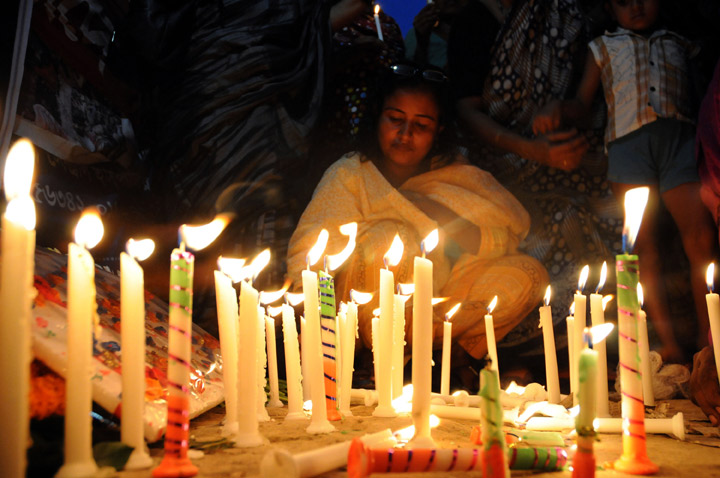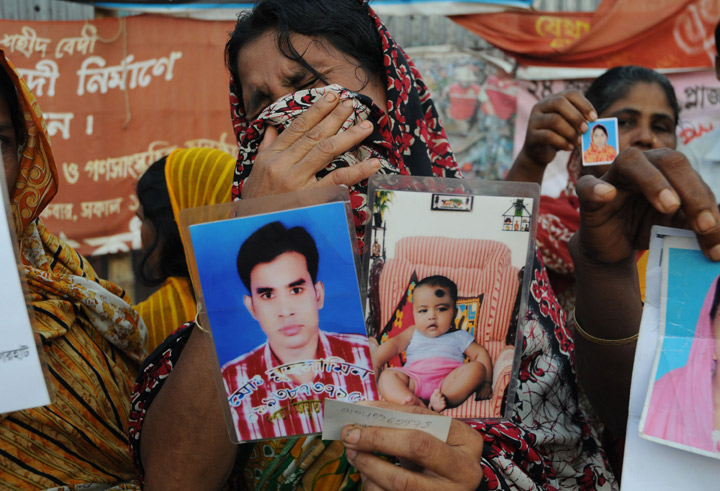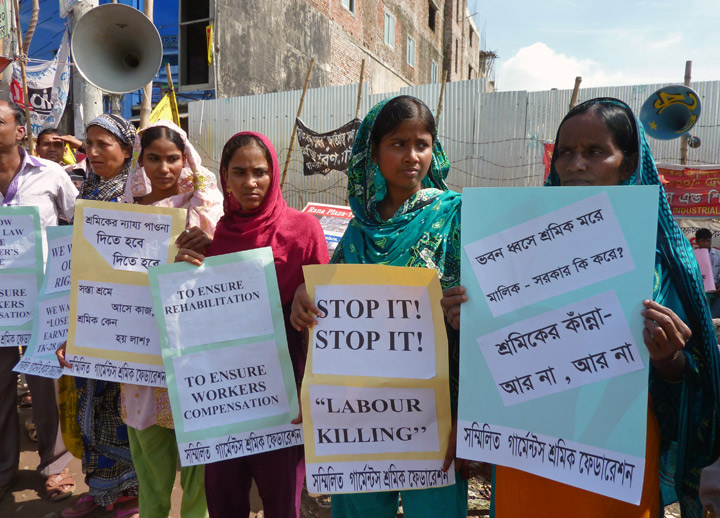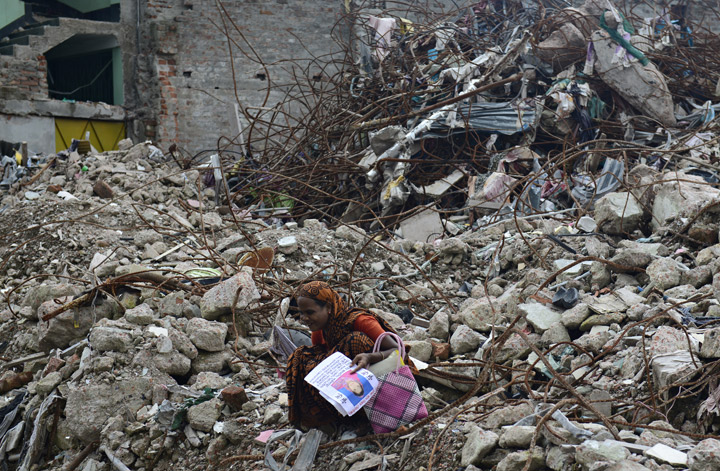TORONTO – Six months after a deadly building collapse killed more than 1,100 people in Bangladesh, a new survey says the victims of the world’s worst garment factory disaster are no closer to recovery.

On Thursday, the non-profit organization ActionAid said it surveyed nearly two thirds of survivors and families of those who died in the disaster and found that 94 per cent reported they have not received any legal benefits from their employers since the collapse, including sick pay or compensation.
READ MORE: Second deadly accident at a Bangladesh factory could have links to Loblaw
On April 24, more than 1,131 people were killed and more than 2,500 others were injured when an eight-storey commercial building collapsed in Savar, a sub-district in the Greater Dhaka Area in the capital of Bangladesh.
“My rent is five months overdue and soon shop keepers will stop giving me credit for food,” said Naznin Akhter Nazma, who was pregnant when pulled from the rubble and lost her husband in the collapse.
The company’s Canadian fashion label Joe Fresh is among the retail brands whose products were made in the building.
Now, half a year later, we take a look at what has—and what hasn’t—changed since world’s deadliest garment-factory accident in history:
To date, only one brand has provided direct compensation. Some brands have denied involvement:
According to IndustriALL, a global union representing 50 million workers in 140 countries in the mining, energy and manufacturing sectors, the discount clothing chain is the only brand to have provided any sort of compensation to the factory victims and their families.
“The stance of the buyers to compensation has been varied, some refuse to engage, others vehemently deny a connection and some deny responsibility because their production ended some time ago or was outsourced to Rana Plaza without their knowledge,” said the union in a press release Thursday.
In September, IndustriALL called a meeting of some of the world’s largest retailers in Geneva to discuss a long-term compensation fund of $74.6 million for those injured and family members of those killed.
Only nine brands whose labels were being produced at the Rana Plaza were represented at the meeting.
In a report released Thursday, Clean Clothes Campaign said Italian retailer Benetton and Spanish chain El Corte Ingles were “participating in attempts to establish a fund” and that other brands, such as Zara-owner Inditex, Britain’s Bonmarche and Mascot of Denmark, also said they had intent to contribute to a fund.
Loblaw said it would contribute to a long-term payment plan:
On Thursday, Loblaw announced a plan to begin funding victims and family members of those who died.
The company’s Canadian fashion label Joe Fresh is among the retail brands whose products were made in the building.
READ MORE: Loblaw commits financial aid to Bangladesh factory collapse victims
Soon after the disaster, Loblaw quickly acknowledged a relationship with a vendor using the plant, which was in breach of multiple building violations when it collapsed.
“This immediate relief, a payment of three month’s wages, will assist in financial needs until long-term funds begin to flow,” said Bob Chant, senior vice president of corporate affairs and communication in a press release.
Should other brands who were involved in the disaster not step forward and join in this funding, Loblaw said it will “immediately contribute to the payment of three months wages for the approximately 3,600 individuals involved, regardless of the brand apparel that was being produced in their workplace.”
The Bangladesh government promised to increase compensation:
ActionAid says the Bangladesh government has given 2.2 million taka, equivalent to US $28,000, to 777 people, about one third of the victims and their family members.
To date, no long-term compensation package for the victims and their families has been agreed upon by the government or by major retailers.
On Sept. 30, the Supreme Court of Bangladesh proposed over 1.8 million Bangladeshi taka (US$23,000) as compensation for each family of the deceased, with 1-1.5 million taka (US$12,900 – US$19,000) for survivors with amputations.
For survivors with complete paralysis, the committee proposed 2 million taka (US$25,700).
READ MORE: Many Canadians say it’s ‘easy’ to ignore child slavery in developing countries, poll finds
Victims and their families have received only some of the promised compensation:
Several labour advocacy organizations say that families who were affected by the collapse have only received a tiny fraction of the promised financial compensation.
According to ActionAid, Primark has already provided three months’ salary of 15,000 Bangladeshi taka (US$190) to 3,300 who were affected by the disaster.
In an interview with the BBC, Primark said that it would continue to pay the wages of those affected for another three months.
“We looked on in horror. We knew our clothes were in the building, and we accepted responsibility,” said Paul Lister, head of corporate governance at Primark’s parent company, Associated British Foods.
Last month, a BBC article said that only families who were able to provide DNA evidence of their relatives’ death received the first payment installment from Primark.
More than 100 retailers signed the Accord on Factory and Building Safety in Bangladesh:
Created in May 2013, the Accord on Fire and Building Safety is a five-year legally-binding agreement aimed at improving worker safety in the Bangladesh garment industry.
The agreement holds companies legally responsible for safety and labour conditions in the factories where they employ people.
At least 100 retailers around the world have agreed to the new Bangalesh factory safety pact. Citing liability concerns, Wal-Mart and Gap have not signed the Accord on Fire and Building Safety accord. A full list of companies who have signed on can be found here.
Loblaw is currently the only Canadian company to have signed the agreement.







Comments